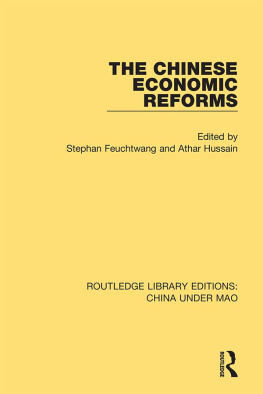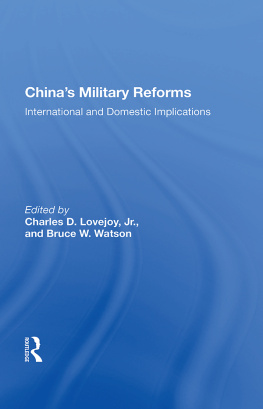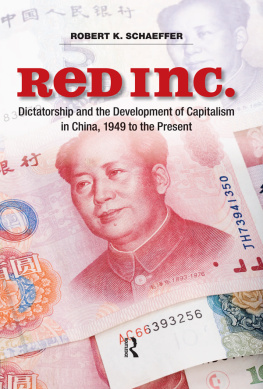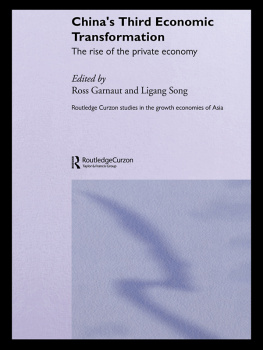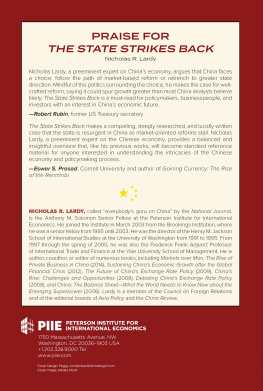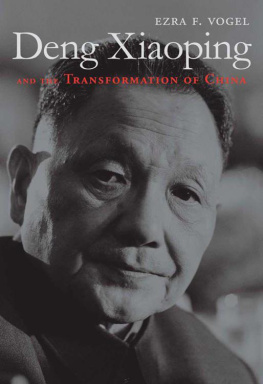The Price of Chinas
Economic Development
THE PRICE OF
CHINAS
ECONOMIC
DEVELOPMENT

Power, Capital,
and the
Poverty of Rights
ZHAOHUI HONG

Due to variations in the technical specifications of different electronic reading devices, some elements of this ebook may not appear as they do in the print edition. Readers are encouraged to experiment with user settings for optimum results.
Copyright 2015 by The University Press of Kentucky
Scholarly publisher for the Commonwealth,
serving Bellarmine University, Berea College, Centre College of Kentucky, Eastern Kentucky University, The Filson Historical Society, Georgetown College, Kentucky Historical Society, Kentucky State University, Morehead State University, Murray State University, Northern Kentucky University, Transylvania University, University of Kentucky, University of Louisville, and Western Kentucky University.
All rights reserved.
Editorial and Sales Offices: The University Press of Kentucky
663 South Limestone Street, Lexington, Kentucky 40508-4008
www.kentuckypress.com
Library of Congress Cataloging-in-Publication Data
Hong, Zhaohui, 1959
The price of Chinas economic development : power, capital, and the poverty of rights / Zhaohui Hong.
pages cm. (Asia in the new millennium)
Includes bibliographical references and index.
ISBN 978-0-8131-6115-0 (hardcover : alk. paper)
ISBN 978-0-8131-6116-7 (pdf) ISBN 978-0-8131-6117-4 (epub)
1. Economic developmentChina. 2. Human rightsChina. 3. ChinaSocial conditions1949 4. ChinaEconomic conditions1949 5. ChinaPolitics and government1949 I. Title.
HC427.95.H68155 2015
338.951dc23
2015006202
This book is printed on acid-free paper meeting the requirements of the American National Standard for Permanence in Paper for Printed Library Materials.

Manufactured in the United States of America.

| Member of the Association of
American University Presses |
To Lan, Nicole, and Emma
Contents
Introduction
A Tale of Two Chinas: Power-Capital China and Rights-Deprived China
It has been more than thirty-five years since China embarked on a road of economic reform and modernization that has led to the most dramatic economic development, social transformation, and cultural metamorphosis in its five-thousand-year history. Chinas rapid development has challenged established theories about economic modernization, which do not seem applicable to the peculiar Chinese situation.
The last few decades have seen a great number of in-depth studies on Chinas economic development. However, while the world is recognizing and marveling at Chinas economic accomplishments, few, if any, works have examined the social and cultural price of the nations economic development in a systematic and comprehensive fashion. Analyzing a series of puzzling and seemingly incomprehensible phenomena generated by the process of Chinas economic development requires all interested scholars to make an effort at mapping Chinas development and in interpreting the progression of human civilization as a whole.
This book will discuss the price of Chinese economic development, focusing on social and cultural consequences since 1978 from historical and comparative perspectives. It will provide a comprehensive account of how much China has paid to reach its current stage of development. The perception of the China Miracle or China Model is incomplete if the price of economic development is ignored, miscalculated, misperceived, or misinterpreted. Overall, the book will concentrate on the institutional costs, social price, and cultural consequences of Chinas economic development since 1978.
DEFINING THE POWER-CAPITAL INSTITUTION
As a result of its economic development since 1978, China has been experiencing three parallel historical transitions: from a planned economy to a market one, from an agrarian society to an industrial one, and from a traditional culture to a civic one. The combination of these triple transitions in political economy, social economy, and cultural economy has generated a power-capital institution (quanli ziben zhidu) that comprises the power-capital economy, the power-capital culture, and power-capital entrepreneurs.
One of the critical ingredients of the power-capital institution is, of course, power, which in this book specifically refers to political power in the executive, legislative, and judicial realms. In general, as James Burns articulates, power consists of motive and resource, which are interrelated. In addition, power is a collective relationship instead of merely the behavior of one person.
The second critical component of the power-capital institution is capital, which covers two dimensions in this book. One is economic in nature, with specific focus on financial and natural capital. According to Werner Sombart, Capital can be defined as that amount of wealth which is used in making profits and which enters into the accounts. In other words, economic capital is wealth in the form of money or other assets owned by a person or organization, available or intended for a particular purpose. Here capital is different from money, as the latter is used simply to purchase goods and services for consumption. In contrast, capital is more durable and is used to generate wealth through investment.
Another dimension of the capital is social in nature, with particular emphasis on the individuals, groups, and classes who are capitalists or Therefore, capital itself does not exist until it is produced. In an effort to produce wealth, capital must be combined with labor, the work of individuals who exchange their time and skills for money. Once capitalists establish a political and economic coalition with political power, they not only produce exceptional profits but also maximize their exploitation of laborers. Consequently, the successful cooperation and integration of both political power and economic capital are indeed the nightmare of laborers, employees, and disadvantaged groups.
The third key factor in the power-capital institution is institutions. As Jonathan Turner defines them, institutions are a complex of positions, roles, norms and values lodged in particular types of social structures.
Obviously, the study of the power-capital institution is one of hybridities, for it is a description of and reflection on the hybrid system produced by Chinas development since 1978, such as the socialist market economy and shareholding cooperative enterprises. In particular, this study of the power-capital institution is connected to yet different from the several popular analytical frameworks on China studies. Interestingly, despite their interpretative differences, many scholars recognize the hybrid nature of Chinese development, evident in their observations about the party-state, state-society, phony capitalism, the totalitarian or authoritarian state, and bureaucratic capital. While providing a number of unique perspectives on the characteristics of the China phenomenon, however, these observations differ from scrutiny of the power-capital institution.
Next page


